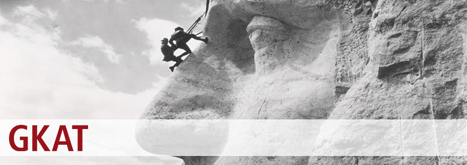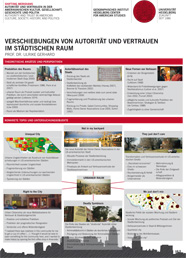Research Project
Research Training Program: Authority and Trust in American Culture, Society, History, and Politics.

GKAT is a research training program located at the Heidelberg Center for American Studies (HCA) that focuses on the emergence and transformation of authority and trust in American politics, society, religion, literature, and culture from the nineteenth century to the present from a profound interdisciplinary perspective. In order to facilitate collaboration between the disciplines, three broad research areas have been designed to reflect local research interests but also concern pressing issues of U.S. society and culture. These three themes are the authority of the modern state and trust in public and social institutions (I), the urban dimension of authority and trust (II) and authority and trust in culture, literature and religion (III).
In Geography, the urban dimension of authority and trust is central. Embedded in a theoretical context of the different meanings of trust and the resulting practices of trust work, we see trust as a social reality that needs to be analyzed from a broad socio-geographic perspective. In our research, we focus on the tensions between institutional power and everyday life in American cities, which has been subject to profound social and economic changes, such as the rise of the service sector, immigration, gentrification, segregation, and branding strategies. Inquiries into the ways in which people of different ethnic and social backgrounds employ authority, trust, identity, and power in urban spaces thus open up numerous new research questions which we address in different research projects.
Ulrike Gerhard and Judith Keller explore the urban dimension of trust in the context of home and housing. As living within cities becomes more and more unaffordable due to neoliberal policies and global market forces, displacement from and discrimination on the housing market shape the everyday realties of many urban residents. This often entails the loss of home for those who are not part of the creative class and international elites, resulting in an increasing fragmentation and disintegration of many American cities. Trust and solidarity do not only erode but are undermined by practices of un-homing such as evictions and forced displacements that lead to major urban restructuring and, at the same time, to increasing inequalities. "My home is my castle"
Cosima Werner’s ethnographic research explores the spatial manifestations of trust in and around convenience stores in marginalized urban neighborhoods. Her case studies are located in some of the poorest neighborhoods of Detroit and Chicago, where convenience stores are often the only place for the communities to meet. Here, distrust rather than trust becomes a decisive factor as manifested in the relationship between the mainly black and male customers, the storeowners, and the patrolling police officers.
Lauren Rever uses the lens of authority and trust to unpack what happens at points of contact between historical institutions and “the public.” Breaking down these points of contact is a starting point to explore tourism, the history profession, labor, identity, and space – key components of historical institutions. This PhD project is part of a larger interdisciplinary endeavor with the graduate program on authority and trust at the Heidelberg Center for American Studies.
In his GKAT project, Anthony Meluso focuses on trust building in Mexico’s factory boom-towns. His research centers interpersonal relationships as well as geopolitical strategy. Regionally, Anthony focuses on Mexico and the Southwestern United States. He translates experiences that transcend boundaries and languages with ethnographic and quantitative methods.
Julia Schinnenburg focuses on how power dynamics play out in digitization processes in city governments. Her research questions and methods are based on her past experiences in the US, Germany and Italy and rely on feminist theory and mixed-methods research designs. Generally, she asks who decides about the goals and processes of digitization, as well as what benefit these projects bring to urban societies at large. Julia believes that digitized government can be a helpful tool in improving lived realities in cities. However, current digitization projects use processes from the business world that are not perfectly suited for government. Through her work she wants to contribute to the knowledge building currently underway, that supports governments in creating more accurate and therefore trustworthy data models to support them in their daily work.




